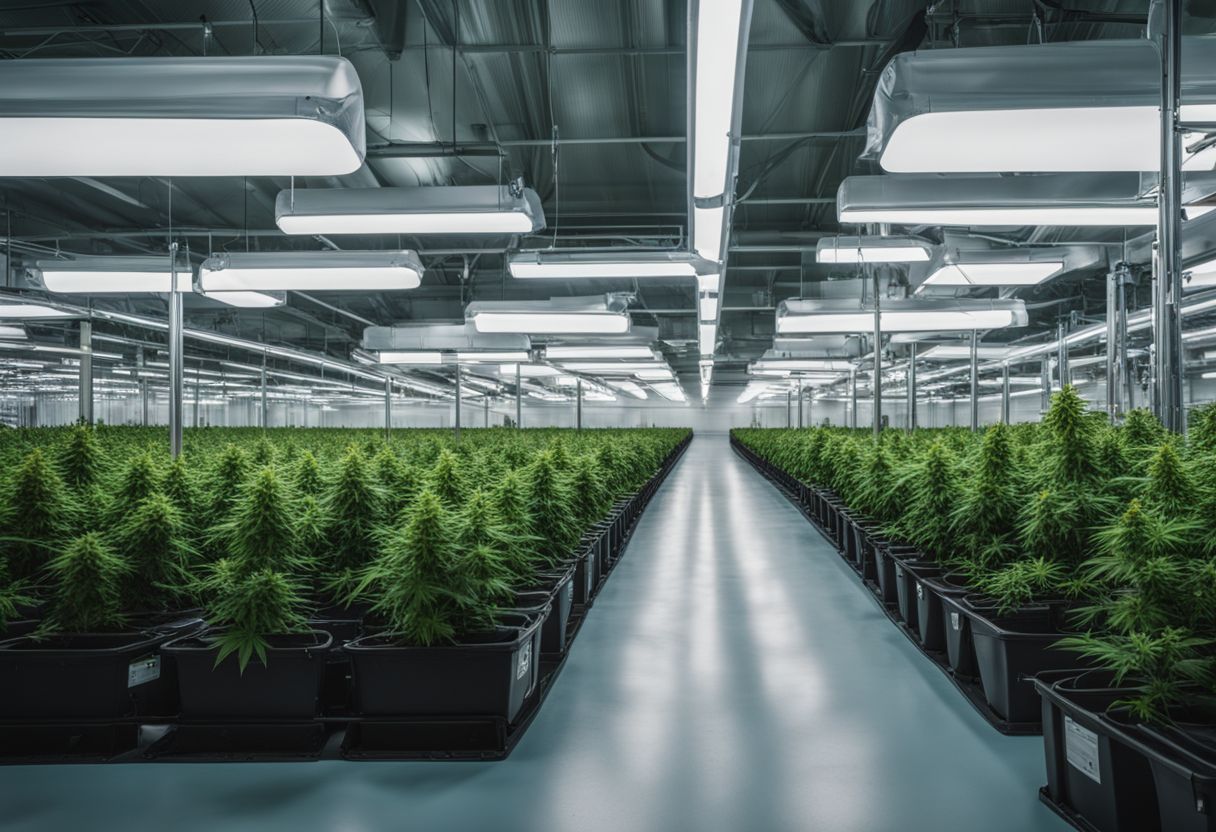Clients are able to receive a free 30-minute consultation with a company representative to get a better understanding of what they need.
Let Us Do the hard work for you

In the rapidly evolving world of cannabis production, maintaining rigorous standards is not just beneficial – it’s a regulatory must. Good Production Practices (GPP) are the cornerstone of quality and safety in this burgeoning industry, yet misconceptions about their complexity and implementation abound.
With years of expertise in regulatory compliance and cannabis cultivation management, I’m here to demystify GPP and guide producers through Health Canada’s stringent requirements.
Compliance isn’t merely ticking boxes; it’s a commitment to excellence that assures consumers access safe, high-quality cannabis products. Federally licensed producers in Canada cannot afford to overlook GPP—it is vital for both market success and legal operation.
This article will unfold practical insights into achieving GPP adherence efficiently, an invaluable resource poised to elevate your production standards. Read on for clarity amidst the maze of regulations.
Let’s dive in.
In the Canadian cannabis industry, Good Production Practices (GPP) serve as the cornerstone of product quality and safety, with Health Canada setting stringent standards to ensure both.
These practices are pivotal in maintaining the integrity of medicinal and recreational cannabis products from seed to sale.
Health Canada checks that companies follow Good Production Practices (GPP) when they make, package, sell, and share cannabis. They make sure every step is done right from the plant’s start to when it goes to the store or customer.
This means watching over how clean things are kept and making certain that products stay safe.
The agency demands that license holders meet GPP rules set in Cannabis Regulations. All licensed producers must have written plans for GPPs. They need to show they use these plans every day and keep records of it all.
Health Canada makes sure everyone follows these strict cleaning rules and keeps quality high so customers get safe products.
Health Canada sets the rules for Good Production Practices in the cannabis industry. These rules help keep products safe and high quality. Now, let’s explore what key elements make up these important practices:
Diving into the world of cannabis regulation, we encounter two pivotal standards: Good Production Practices (GPP) and Good Manufacturing Practices (GMP). While both frameworks aim to ensure product safety and quality, they hold unique requirements that distinguish one from the other, with GMP holding significant weight for those eyeing international market spaces.
Distinguishing between Good Production Practices (GPP) and Good Manufacturing Practices (GMP) is essential for understanding the Canadian Cannabis Industry’s regulations. Below is a comparative table outlining the key differences:
| GPP (Good Production Practices) | GMP (Good Manufacturing Practices) |
|---|---|
| Required quality standard for Canadian Licensed Producers (LPs) of cannabis. | Not mandatory in Canada for operation, but essential for international market compliance, especially Europe. |
| GPP focuses on ensuring the quality of the production environment in Canada. | GMP encompasses a broader range of quality control measures, including product consistency and safety. |
| Designed to ensure the safe production of cannabis by minimising contamination risks. | Covers all aspects of production, from raw materials to the final product, to ensure it is fit for its intended use. |
| Health Canada enforces the GPP regulations for cannabis producers. | GMP certification, while not legally required in Canada, is dictated by international standards for medical cannabis exports. |
| Compliance with GPP is a federal license requirement by Health Canada. | GMP certification is a costly and time-consuming process that is necessary for exporting medical cannabis from Canada. |
| Does not equate to GMP certification but sets the foundation for proper production practices. | Mandatory for European markets – EU-GMP standards apply for import/export of cannabis into the European Union. |
While GPP sets the stage for domestic production, stepping into international markets demands GMP certification. This “gold standard” is crucial as it assures that products meet the highest quality levels.
For instance, European countries and non-EU nations require cannabis producers to adhere to EU-GMP standards if they want to sell their goods there. It’s a clear sign of trust in a product’s safety and consistency.
Gaining GMP certification opens doors around the world, making it necessary for those looking at global opportunities. Australia mandates that all medical cannabis imports must be made under GMP conditions starting from July 2023.
This move shows how seriously international markets take these guidelines. They use them as benchmarks to guarantee top-notch medicinal products reach consumers.
For companies aiming high, software validated by GMP plays a vital part too. Such technologies support expansion and enhance work across borders by streamlining production and keeping quality steady even when demand grows or processes get complex.
Securing a federal cannabis licence in Canada necessitates strict adherence to Good Production Practices (GPP), which serve as the foundation for maintaining product integrity and public safety.
This section delineates the journey towards GPP compliance, stressing its critical role within the licensing framework for cannabis enterprises.
Standard Operating Procedures, or SOPs, are like a map for cannabis companies. They show every step workers need to take to keep things clean and safe. Health Canada wants to see these written plans.
They check to make sure the businesses are using them every day.
SOPs help stop bad stuff from getting into the cannabis, like dirt or germs. They tell workers how to keep rooms where they grow or make cannabis products in good shape. Everyone at a cannabis company uses SOPs — from bosses to cleaners.
This helps everyone do their job right and stops mistakes that could hurt the plant or people who use it later on.
Good production practices in the Canadian cannabis industry require strict cleanliness and quality checks. Here’s how producers keep everything safe and up to standard:
In the world of cannabis production, quality assurance is a big deal. It makes sure every product meets Health Canada’s rules. Experts check things like cleanliness and safety to help producers stay on track.
They look at how companies make their products from start to finish.
Having strong systems in place helps with this. Producers must record everything they do, from growing plants to packing them up for sale. This way, inspectors can see that they follow all the right steps.
Support teams work with businesses to keep their operations clean and safe and ensure they are doing their best work according to GPP standards. Professionals offer advice on meeting these standards without making things too hard or confusing for staff.
Next up is how Good Production Practices shape Canadian cannabis businesses.
Adherence to Good Production Practices not only enhances product quality for Canadian cannabis producers but also fortifies consumer trust in this burgeoning industry. By implementing GPP standards, businesses safeguard health while positioning themselves competitively both domestically and on the global stage.
Advantages of GPP compliance for businesses and consumers
Good Production Practices (GPP) set the stage for safety and quality in the cannabis industry. They ensure that every product meets high standards, from growth to sale.
Health Canada sets rules for making safe cannabis products. These rules help keep everyone healthy. To sell cannabis in Canada, you must follow these important steps. Doing this right means safer products for people to use.
If you need help with these rules, experts can guide you. Making sure we all do this helps us have good things to enjoy safely.

Good Production Practices make sure that cannabis products are made cleanly and safely to protect users. Health Canada makes rules about how to grow, handle, and make things like oils and edibles without harmful stuff like pesticides or germs.
To sell cannabis for medical use or as an adult product, you must have this license from the government. It shows you follow Health Canada’s strict rules about making sure your products are safe.
Health Canada will come and look at your place where you grow or make cannabis to see if it’s clean and safe. They want to be sure there is no dirt or unwanted chemicals around that could hurt people.
Yes! You should only use materials that won’t mix bad chemicals into the product when growing or storing cannabis—things like good water, proper storage containers, and safe cleaning supplies.
Take action quickly to fix any problems they say you have with making your product safely; then tell them what changes you’ve made so they can verify everything is now okay.
It’s very important because food safety keeps customers from getting sick from things like bugs, mold, or bits of metal mixed into their food by accident.
MFLRC is a one-stop shop for all of your Licensing, quality assurance and compliance needs. Our team has years of experience in the cannabis industry and are experts in all facets. We offer a variety of services that will save you time and money. Let us take the burden off your shoulders so you can focus on what’s important – growing your business.
Contact us Now!
Mussarat Fatima, President, and owner of MF Cannabis License and Regulatory Consultants has more than twenty years of experience in Quality Assurance, Quality Control, and Regulatory Affairs within the pharmaceutical, Food and Cannabis industries. She has a Master’s Degree in Food Sciences and Biochemistry; in addition to this, she also has a diploma in pharmaceutical Quality Assurance, Regulatory Affairs, and Quality Control. Also, she has completed several certifications specifically in Cannabis Quality Assurance, Regulatory Affairs, and Facility management from recognized institutes in Canada.

Written By: Mussarat Fatima
President at MF License & Regulatory Consultants
Website: https://mflrc.com/
Contact: info@mflrc.com